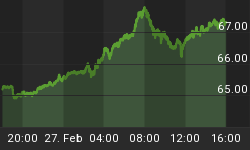The ISM PMIs for March indicate continued upward price pressures in the US economy. My GDP-weighted PMI (manufacturing and non-manufacturing combined) seems to indicate that the CPI inflation rate is heading for 4% in the coming months.

Sources: ISM; I-Net Bridge; Plexus Asset Management.
Since the last quarter of 2008, CPI inflation actually surprised on the downside as far as the GDP-weighted PMI is concerned.
I prefer the oil price as core indicator of US CPI inflation - and more specifically, the absolute change in the price of Louisiana Sweet crude compared to a year ago - above the GDP-weighted PMI for prices. The gap that opened between the change in the oil price and the CPI inflation rate since the end of 2009 is clearly visible.

Sources: I-Net Bridge; Plexus Asset Management.
The lower than normally expected inflation rate can be ascribed to the woes of the residential property market, though. Shelter's weight in the CPI is approximately 32% and the impact of declining inflation and deflation on the overall CPI is evident in the following graph.

Sources: Bureau of Labor; Plexus Asset Management.
To me CPI ex shelter inflation is a better indication of how US citizens' wallets are being affected. Even more important is the fact that most of CPI ex shelter inflation is explained by changes in the oil price. It is particularly evident since the end of 2006, where more than 94% of the direction of the CPI ex shelter is explained by the year-on-year absolute change in the price of crude oil.

Sources: Bureau of Labor; I-Net; Plexus Asset Management.

Sources: Bureau of Labor; I-Net; Plexus Asset Management.
But where is CPI inflation heading?
From the above it is obvious that to ascertain where CPI ex shelter inflation is heading, you need to take a view on the oil price. The immediate outlook for CPI ex shelter inflation can easily be determined. With the current price of crude at approximately $25 per barrel, the historical relationship puts the year-on-year CPI ex shelter at 4.26% in April compared to my calculated 3.51% in March - a rise of 75 basis points! The year-on-year momentum in the shelter CPI has been drifting upwards to 1.01% in March. If I keep the shelter CPI inflation rate unchanged, the overall CPI compared to a year ago is likely to come in at approximately 3.2% or 50 basis points higher than March's 2.7%! Is that expected by the financial markets?
Without taking a stab at where the oil price is heading, I looked at three scenarios where the price per barrel of Louisiana Sweet crude was kept constant at $100, $125 and $150 respectively for the next 12 months. That was then compared to the price a year ago.

Sources: Bureau of Labor; I-Net; Plexus Asset Management.
By applying the historical regression equation, the trend of future CPI ex shelter, year-on-year inflation is as follows:

Sources: Bureau of Labor; I-Net; Plexus Asset Management.
It is evident that, should the price of crude oil fall back to $100 in the immediate short term, my expected 4.26% year-on-year CPI ex shelter inflation for April will mark the top of the current inflation cycle. If, however, the oil price maintains its resilience at $125, the year-on-year CPI ex shelter inflation rate is likely to peak only in June at approximately 5.2%. A further rise to $150 in the oil price will see the CPI ex shelter CPI topping out in August at approximately 7.0%.
Assuming that the year-on-year inflation rate for shelter remains steady at 1.0%, the outlook for the overall CPI inflation rate is as follows:

Sources: Bureau of Labor; I-Net; Plexus Asset Management.
What is clear to me is that the US year-on-year overall CPI inflation rate is likely to peak in the next three months, unless the oil price surges to new heights. If the oil price maintains current levels, the CPI inflation rate may surprise financial markets on the upside and lend further support to inflation hedges such as gold and silver.
Did you enjoy this post? If so, click here to subscribe to updates to Investment Postcards from Cape Town by e-mail.















